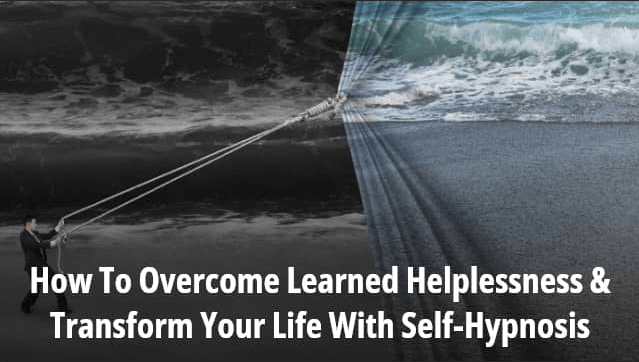Learned helplessness is a pervasive psychological phenomenon that can hinder personal growth and prevent individuals from achieving their true potential. Hence, it is important to understand this mental barrier in order to overcome it and thus transform your life. In this blog post, we will explore the concept of learned helplessness and how hypnosis can be a powerful tool to break free from its grip.
Understanding Learned Helplessness
Learned helplessness is a state of mind where individuals believe they have no control over their circumstances, leading them to give up trying to change or improve their situation. This mindset often develops from repeated failures, stress, and a perceived lack of control over events.
Origins of Learned Helplessness
Learned helplessness can be traced back to various sources, including:
- Past Failures: Repeated failures can erode self-confidence and instill a belief that success is unattainable.
- Stress and Emotional Chaos: Chronic stress and emotional turmoil can overwhelm an individual, making them feel incapable of managing their life effectively.
- External Locus of Control: When people believe that external factors, rather than their own actions, dictate their life’s outcomes, they are more likely to develop learned helplessness.
The Dog Experiment
A poignant illustration of learned helplessness comes from an experiment conducted on dogs. Researchers placed dogs in a cage with an electrified floor. Initially, the dogs tried to escape the shocks, but when they realized they couldn’t, they gave up and passively endured the pain. Even when the cage door was eventually opened, the dogs, conditioned by their previous experiences, remained in the cage despite the opportunity for freedom. This experiment mirrors how humans, when faced with insurmountable challenges, can also become paralyzed by learned helplessness.
Breaking the Cycle with Hypnosis
Hypnosis is a powerful tool that can help individuals access their unconscious mind, reframe negative beliefs, and foster a sense of control and empowerment. Here’s how hypnosis can assist in overcoming learned helplessness:
1. Accessing the Unconscious Mind
Hypnosis allows individuals to enter a state of deep relaxation, where the unconscious mind becomes more accessible. In this state, the mind is more receptive to positive suggestions and can reframe past experiences in a way that promotes growth and resilience.
2. Smoothing Emotional Chaos
One of the key aspects of overcoming learned helplessness is addressing the emotional turmoil that often accompanies it. Hypnosis can help soothe these chaotic emotions by encouraging the mind to process and release negative feelings associated with past failures and stress.
3. Reframing Negative Beliefs
During hypnosis, individuals can be guided to re-examine their negative beliefs and identify the inconsistencies and flaws in these thoughts. By understanding that the belief in their helplessness is rooted in past experiences, they can begin to dismantle this mental barrier and replace it with a more empowering mindset.
4. Cultivating a Growth Mindset
Hypnosis can also reinforce the principles of a growth mindset, resilience, and self-compassion. By simulating future scenarios where the unconscious mind continually searches for lessons and growth opportunities, individuals can develop a deep-seated trust in their ability to adapt and thrive, regardless of challenges.
Hypnotic Induction for Overcoming Learned Helplessness
To demonstrate the practical application of hypnosis in overcoming learned helplessness, here’s a brief hypnotic induction you can use for yourself or your client:
- Preparing: Close your eyes and take a few deep breaths, allowing yourself to relax and drift inward.
- Deepen the Trance: Focus on the sensation of your body resting on the surface beneath, and find a comfortable rhythm in your breathing.
- Introduce Positive Suggestions: As you relax, suggest to yourself that your unconscious mind is capable of identifying and soothing any negative emotions, finding the lessons in past experiences, and reframing their beliefs in a positive light.
- Visualize Positive Change: Guide yourself to visualize a future where you are empowered, resilient, and capable of adapting to any situation. Imagine yourself successfully navigating challenges and feeling a sense of satisfaction and delight in your growth.
- Reinforce the Process: Remind yourself that your unconscious mind will continue this process of growth and adaptation, even after the self-hypnosis session ends.
Embrace the Power of Change
The journey to overcoming learned helplessness is not bound by age or past traumas. As long as an individual is alive, they possess the potential to make significant changes in their life. Hypnosis offers a direct route to the unconscious mind, where deep-seated beliefs can be transformed, and a new, empowered mindset can take root.
By integrating hypnosis into your practice, you can help clients break free from the cycle of learned helplessness and embrace a life of growth, resilience, and self-compassion. Encourage your clients to explore their unconscious mind, reframe their past experiences, and visualize a future where they are in control of their destiny.
Conclusion
Overcoming learned helplessness is a vital step in personal and professional development, particularly for aspiring and professional hypnotists. By understanding the origins of this mindset and utilizing the transformative power of hypnosis, you can empower yourself and your clients to achieve meaningful change and unlock their full potential.
If you have experiences or success stories related to overcoming learned helplessness through hypnosis, we’d love to hear from you. Feel free to share your journey with us at hypnosis@getquicksupport.com. Remember, every step towards growth is a victory, and your story could inspire others to embark on their path of transformation.

